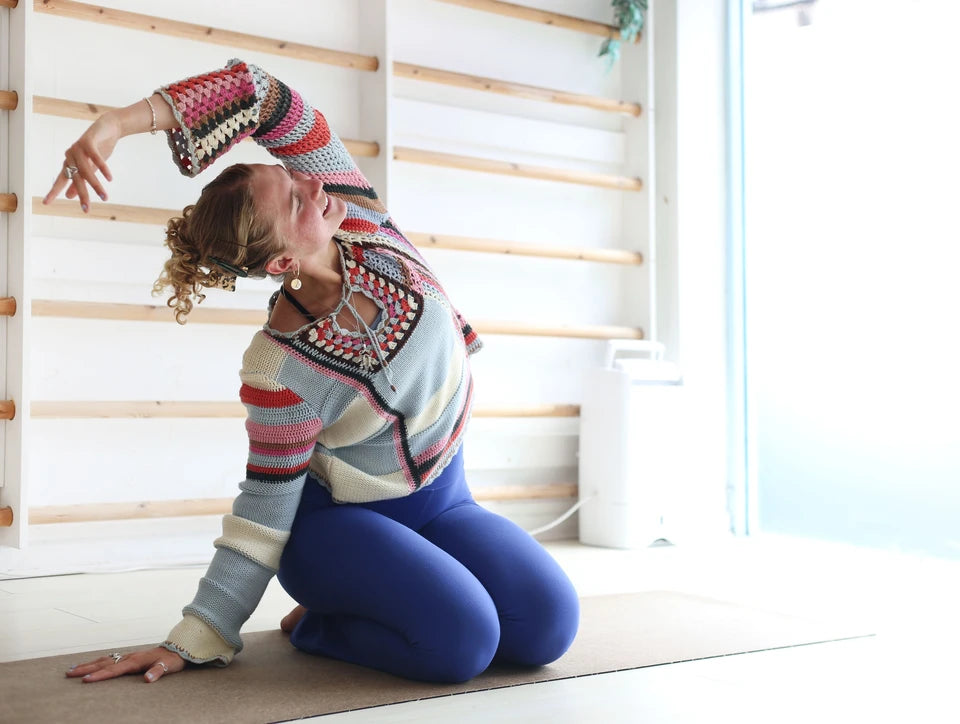Healing Through Yoga: how yoga helped me with DPDR

Written by Poppy Whittaker.
Feeling too much & nothing at all
Human beings are beautifully complex. Each of us, uniquely processing the external world, whilst simultaneously navigating the treacherous landscapes of our internal environment. We are multi-faceted individuals with comprehensive personalities. Yet, as is the way with modern society, we are often forced to place ourselves into a box.
Are you a cat or dog person? Sweet or savoury? Morning or evening?... It’s not always useful to refine ourselves into these binary categories, yet I guess they serve a purpose in helping us filter through the complexities of the self. A categorisation that I feel drawn to is the question of whether you are a ‘thinker’ or a ‘feeler.’ The former indicates someone who is grounded in objective principles and logical facts, and the latter aligns with someone who is rooted in interpersonal matters and emotional factors. These two states exist on a continuum, and whilst neither approach is inherently better or worse, I am definitely more of a ‘feeler’.
I have always been someone who leans into the depth and breadth of their emotional experiences.
I often dance about my days, absorbing the full spectrum of my feelings, from fizzing excitement and overpowering joy, to raw, tearful sadness and hard, piercing grief… the whole lot. I initially saw this as a blessing; how amazing that I could sense in such a way. However, as I grew older and life threw its challenges my way, I began questioning the efficiency of my ‘feeling’ self. It was all fine and well when I sensed desirable feelings, yet when things felt tough, I would often enter an emotional paralysis in which my feelings felt so overwhelming that I was swallowed by them, unable to see life beyond that present discomfort. After an intense period of recurring overwhelm, I realised that this state was unsustainable, let alone exhausting. It's not that I wanted to disengage from these feelings altogether; it just felt necessary to calm the intensity of my emotional profile.

You know the saying ‘be careful what you wish for’? Well…
In 2020, I began experiencing symptoms of depersonalisation and derealisation (DPDR), a mental health condition that dampens your perception and sensation of the self and the world. This manifested in a feeling of being completely detached from myself. I failed to recognise the sound of my own voice, and when I looked in the mirror, I felt as if I was staring into the eyes of a stranger. It was as if I was a puppet on a string, with every micro-movement being controlled by something outside of my conscious choice. Even my memories felt like they didn’t belong to me, but were snippets from a storybook, void of any emotional relevance to my life. My concept of time and space became warped, and I felt severely shut off from the world around me. In conversations, I would comply with the expected social cues of the situation, yet I was simply acting in the role of ‘Poppy’ - most of my smiles, laughs and nods of agreement felt cued by a hypothetical script, rid of any authentic expression. I don’t tend to use this word, but I genuinely felt as if I was going insane.
I held this within me for so long and refrained from sharing it with anyone in fear that they wouldn’t understand or would refer me to a clinical practice to get sectioned (not that there is any shame in being sectioned; it just felt like a lonely and daunting prospect to me). Even if I wanted to share it with someone, I didn’t have the words to comprehend what I was experiencing. It felt so alien and indescribable. Only now, having managed these symptoms for three years, am I able to articulate my experience in such a way. At the peak of my symptoms, I was craving sensation, yet unwillingly inhabiting a place of persistent emotional numbness.
My mind and body were under intense stress, and I was crying out to reconnect with my ‘feeling’ self.
I knew something had to shift when my disillusion of the world extended from myself, to include other people. I have a vivid memory of gazing into the eyes of a loved one and failing to emotionally recognise their presence. I could name them, I could describe them, I could touch them, but my emotional blueprint of their personality had been swept away from my senses.

This is where yoga enters the picture. I had been practising yoga since my early teens when I’d visit the local gym with my mum. I loved how it encouraged me to get out of my head and into my body. When I realised that my DPDR was causing a severe disconnect between my mind and my body, my appreciation for yoga significantly amplified. I moved through a different yoga flow most days, some from the comfort of my bedroom, others in the delight of a local studio. These classes were my medicine. I’d often begin the session as an empty book, and each pose would trace a new line onto the page of my existence, enabling me to map out my body in a safe and contained way. I found comfort in yin and restorative practices as they helped me find stillness.
On an emotional level, this stillness enabled me to reveal what I was burying underneath the surface, and on a physical level, it allowed me to redefine the boundary between myself and the world. Slowly but surely, I regrew.
Do you want to know how I knew things were taking a positive shift? Like a lot of my evenings at the time, it involved a night of tears. But these tears felt different. Rather than coming from a lifeless place of emotional withdrawal, I was actually feeling these tears this time - feeling the tightening of my lids as they squeezed out another drop, the watery texture as they melted down my cheek, the swirling life-force in my belly that felt tingly and alive with spirit. In acknowledging this, I began crying even more - an added layer of happy tears at the fact that I was able to feel the sad tears once again, after being unable to do so for so long.
I am deeply grateful to have reignited my connection to my emotions. I still experience DPDR from time to time, but now I have a greater capacity to cope. These days, in times of emotional intensity, yoga serves as the perfect antidote to soften the explosiveness of my all-embracing mind. Layer by layer, the practice helps me disentangle from my emotional web and re-root into a more peaceful, stable state of existence. Breathwork helps me anchor into my body; movement reminds me of the fluidity of the human experience; meditation alleviates mental compression, and mantra soothes my nervous system. Collectively, these practices provide space and lightness to my thoughts and help me drop into a restful state of being that withstands both on and off of the mat.
When I am connected to my yoga practice, I can access a tranquil state of contentment where I still experience deep-rooted emotions, yet I can hold space for them to arise more effectively and refrain from over identifying with them or shutting down from them completely.
In these times of strength and resilience, I am able to confront feelings that have often been stagnant within me for a long time.
I ask myself:
- Where do I observe this feeling in my body?
- If this feeling had a voice, what would it be telling me?
- If I detach from the narrative that I am placing on this feeling, would the sensation appear the same?
Addressing these questions enables me to take control of my feelings rather than them taking control over me. By airing out my emotions , it enables them to flow through me and eventually out of me. I often compare this process to ‘shaking up the snow globe of one's existence’. When the turbulent snow storm has passed, the flakes fall softly back into place, gently landing on the surface of my psyche to create a fresh layer from which to perceive my experience by - one that is grounded in loving awareness.
It is important to state that sometimes it can be tough to access this place of awareness. Whilst several people in my life are naturally grounded in their emotions with ease and stability, I have to dedicate a significant amount of effort for this perspective to prevail. It is a constant journey of re-learning and reconnecting to the innate softness and presence that is abundant within us all. In fact, at the time of writing this, I’ve been processing some heart-felt emotions that are relatively destabilising.
Now more than ever, my yoga practice is acting as a ritual from which to draw solace, enabling me to authentically and unapologetically accept where I am at right now.
I am fortunate to live in a city that is abundantly decorated with yoga studios. Some classes that have facilitated a deep sense of calm include the nurturing guidance of Bryony Hannah and Nicole King, as well as the creative flows from Jo Green, Anz Loveridge, Carrie Brassley and Charlene Lim. I would also like to express my gratitude for the compassionate presence of Briony Kate and Rosa Lia, whose knowledge and empathy are fruitful and inspiring.
Over the years, I have found it deeply empowering to give a voice to something that once felt so frightening. Approximately 50% of people will experience a brief episode of DPDR in their lifetime, and 2% will have severe and persistent symptoms. As a psychology graduate, one of my life goals is to fore-front DPDR awareness in educational, healthcare and professional settings. With greater advocacy, it will validate this seemingly intangible condition and allow those who experience it to reconnect to the safety of their external and internal worlds.
If you resonated with anything that I’ve shared, want to learn more about DPDR , and/or are experiencing symptoms yourself, then I have attached some useful links below. I’d like to close this blog post with some words from the 13th-century poet, Rumi. This poem has held me through a lot and it perfectly captures the breadth of the human experience and the importance of greeting your emotions with curiosity, acceptance and warmth.
Useful Links:
- ‘Unreal’ - A DPDR Charity that raises awareness and support: https://www.unrealuk.org/
- A very helpful book for managing and alleviating DRDP symptoms: Click Here
- A therapeutic guide to overcoming DPDR: Click Here
Poppy currently teaches our Saturday 3.30pm Yin Yang Flow, which she will be passing onto one of our other lovely teachers in the new year, so do be sure to come along before then! Her last class will be with us on the 27th January! Bookings for classes can be made here.


